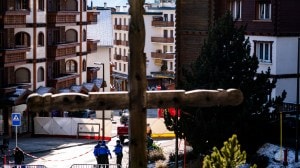Judge for yourself
This article, I promise you, is not about cricket. It is about the retiredjudiciary, instead. It would, unfortunately, seem pretty awfulif...

This article, I promise you, is not about cricket. It is about the retiredjudiciary, instead. It would, unfortunately, seem pretty awfulif the lemon Justice Chandrachud has produced on his cricket inquiry isanything to go by.
This is not to say that he should have ratified all the rumours in thecricket bazaar, but certainly, when a former chief justice of India isassigned to conduct an inquiry into such a serious matter, you would expectnot only something better and more conclusive than this, but also somethingthat convinces you that the judge has not shied away from the usual rigoursof an inquest of this kind.
His report, unfortunately, is an eyewash, a wishy-washy disaster that wouldmake the Subrahmanyam Committee8217;s Kargil report which also said verylittle sound like the South African Truth and Reconciliation Commission.If this is the methodology of an inquiry a former chief justice of Indiaconducts, if this is the quality of questioning and if so casual anddismissive is the tone of his findings such as they are it must make youwonder what has gone wrong with the retired judiciary, so frequently calledupon for verdicts of great moment.
It is a fear one expresses with great trepidation. All of us have beentrained to fear only one thing, the contempt law where, as our lawyersendlessly lecture us, even the truth is no defence. But the higher judiciaryhas been extremely tolerant of criticism and just as liberal in itsinterpretation of the contempt law. Which is why it is even more importantthat someone holds the mirror to it. And if the reflection is the quality ofwork several of its leading lights have done in recent past on judicialinquiries, it won8217;t make a pretty picture.
My quibble is not with Justice Chandrachud8217;s conclusions but with the way hehas approached his job. Almost as if his brief was to go through themotions, spend long hours with cricketers past and present and the hacks onthe cricket beat, discussing the problems in the cricket world in a mannerthat sounds clubby, to say the least. Consider, for example, his conclusionon the reports that, worried by suspicions of match-fixing, Ajit Wadekar hadonce put taps on the players8217; phones. Chandrachud says: quot;I consider ithardly likely that a man of such wide and large experience as Ajit Wadekarwill indulge in the gimmick of tapping the phones of the players. I answerthis question accordingly.quot; It is just as well, you8217;d think, that the Delhipolicemen were not people of quot;such wide experiencequot; as to have indulged inthe same gimmick.
If the judge had shown a bit more inquisitiveness, he would have come upwith something more substantive long before the Cronje episode and perhaps areal inquiry report from him would have helped stem the rot in cricketbefore it had gone so deep. But why blame Chandrachud alone?
Do you remember the kind of fictional, conjectural fancy tales Justice M.C.Jain produced in his inquiry on the Rajiv Gandhi assassination? Hisunsubstantiated insinuations against the DMK led to the fall of a governmentand yet nobody in our political system in the ruling coalition or theopposition, has ever raised questions on the DMK8217;s national commitmentagain. Once again, the issue is not whether what he said was correct or not,but that he said it so unconvincingly, so casually, that no one reallybelieved it. Not even Arjun Singh and others who used the selective,well-timed leaks of the same report to bring down the Gujral government. Whydid they themselves never take up the issue again? Why don8217;t they order asocial boycott of Murasoli Maran, the leading light of the DMK in Delhi? Whydon8217;t they move at least a PIL seeking a more detailed inquiry to nail thealleged traitors? Why not indeed, unless they too, like many of us, andcertainly this newspaper, found that inquiry report so unconvincing andflighty?
Our higher judiciary is acknowledged internationally to be top class, interms of intellect as well as integrity. So what goes wrong when the samevery eminent men who constitute the bench then produce such embarrassingstuff in inquiry commissions? This, indeed, is by now a firm tradition.
Justice Thakkar of the quot;needle of suspicionquot; fame in the Indira Gandhiassassination inquiry, Justice Ranganath Mishra in his report on the riotsagainst the Sikhs in 1984 have all produced reports that convinced no one,not to talk of the kind of evidence that could ultimately lead to convictionof the guilty. Many other judges have courted fame8217; by dragging inquirieson for years, squabbling with the bureaucracy over little trappings of theEstablishment: PAs, air-conditioning for their cars, office space and so on.
It is an entirely different matter that on the odd occasion when a judgeproduced something substantive like the Srikrishna Commission in Bombaythe government threw it out for political reasons.
Justice Chandrachud pleads that while he is open to criticism, people mustunderstand that a judge can only arrive at a conclusion on the basis of theevidence produced before him. In his case, as in the case of all thesecommissions, the presiding judge8217;s job was also to look for evidence. Thatis exactly what a great judge does even while presiding over day-to-daylitigation. It was, in fact, said of Justice J.S. Verma in the hawala andother corruption cases that instead of merely examining available evidence,he went looking for it. A judge, particularly one of the seniority andeminence of a former chief justice of India, had better accept fullaccountability and responsibility of the findings he produces. Thequality of evidence can be no alibi.
Man-made disasters, communal massacres, rail crashes, airplane hijackings,cinema hall fires, financial scandals that rock the stock markets, wheneversuch calamities strike us we immediately clamour for a judicial inquiry. Welost faith in our civil magistracy a long time ago. We never trusted thepolice to begin with. The CBI has made a fool of itself so many times in thepast few years that its inquiries have become a joke and never measure up tothe titillating promise of the leaks made by its own dirty tricks cell. Itis because we had become so sceptical about all these that we nurse thistouching faith in judicial inquiries. But given what our judicialcommissions have delivered of late, we might be better off appealing to LordBalaji of Tirupati to intervene, instead. Or, if He is unable to spare time,maybe we could ask the reporters of Outlook. Of course, for the mostchallenging of cases you8217;d need the help of the special investigative bureauof The Indian Express.
Meanwhile the judges can relax in retirement and look back on the greatjudgments they wrote. At least that way they won8217;t damage through these shaminquiry commissions the great reputations they have built for theinstitution of judiciary in their decades on the bench.
- 01
- 02
- 03
- 04
- 05































